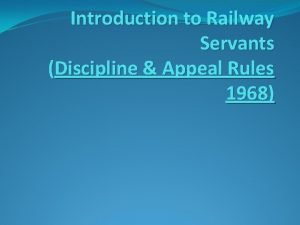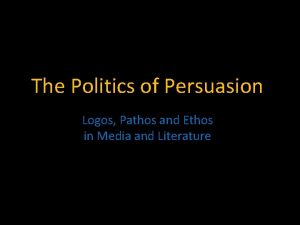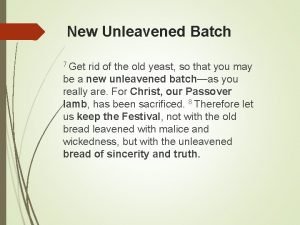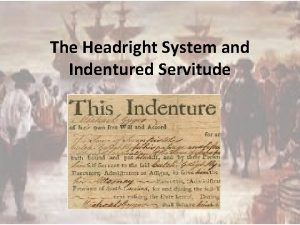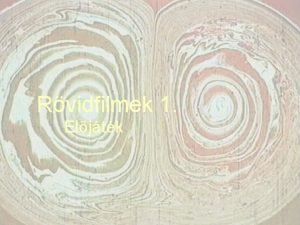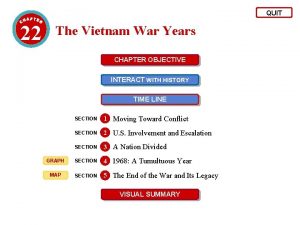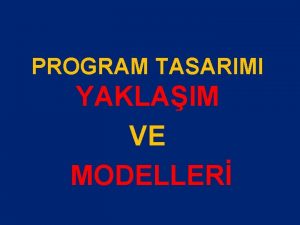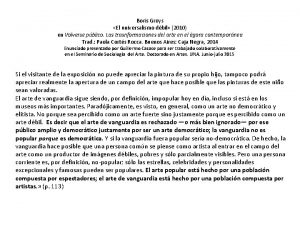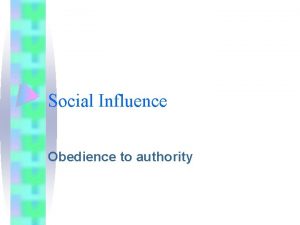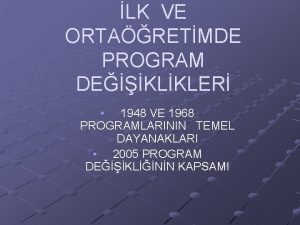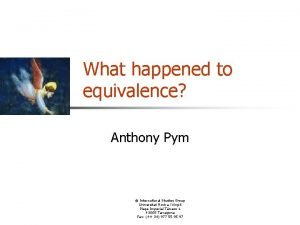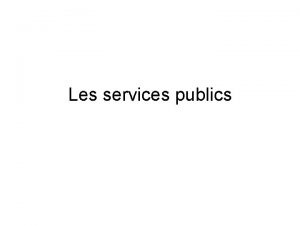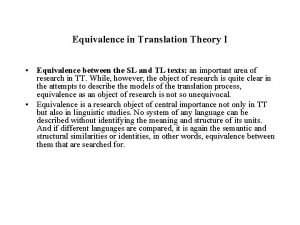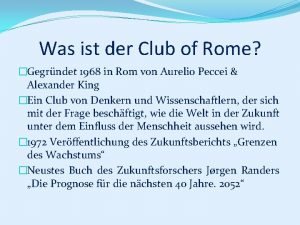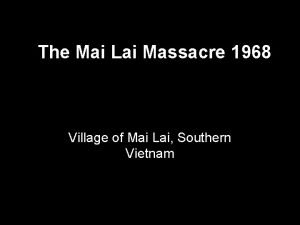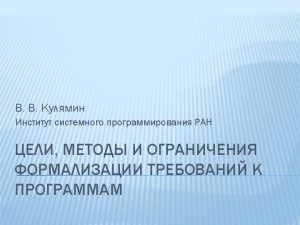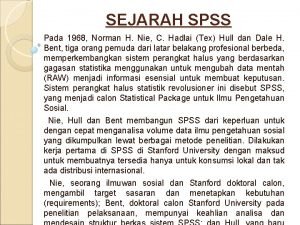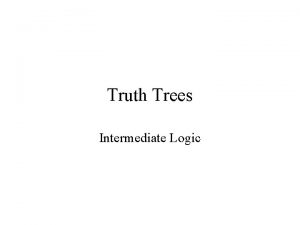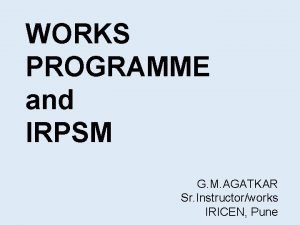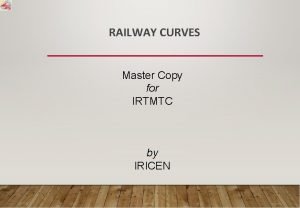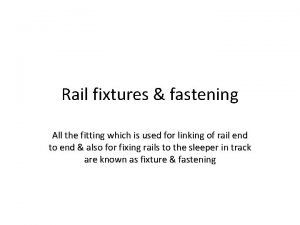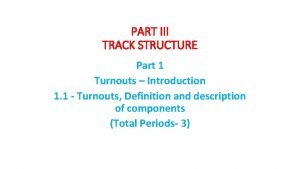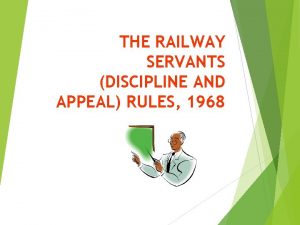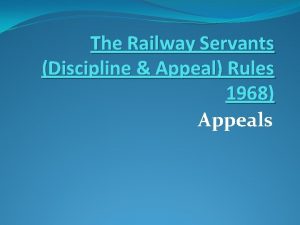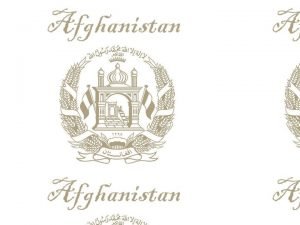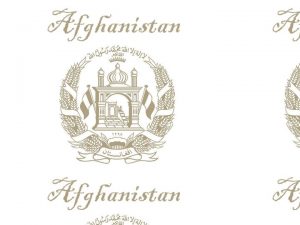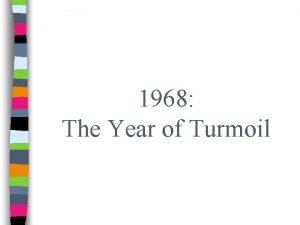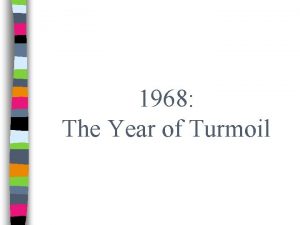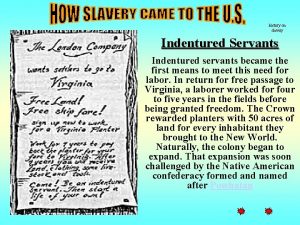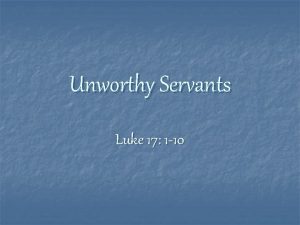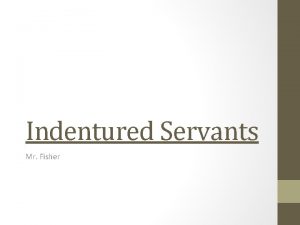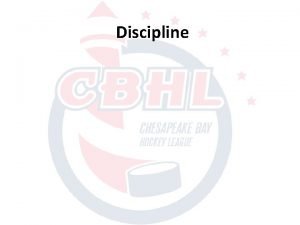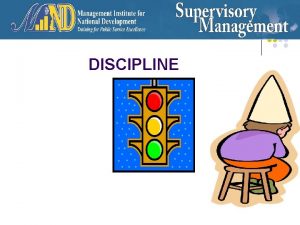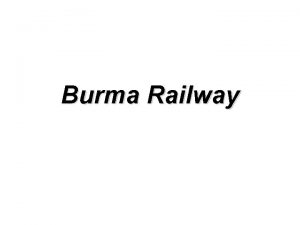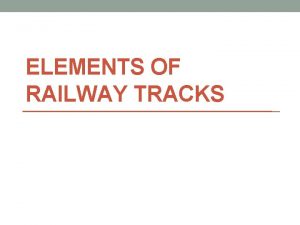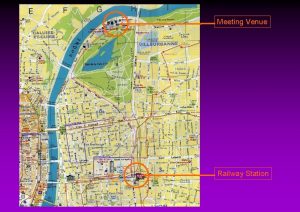Introduction to Railway Servants Discipline Appeal Rules 1968












































- Slides: 44

Introduction to Railway Servants (Discipline & Appeal Rules 1968)

1. Introduction: �Constitutional Provisions: Article 309 of the Constitution. �Under Article 311(1) no civil servant shall be removed or dismissed from service by an authority subordinate to the authority who appointed him. �Under Article 311(2) no civil servant shall be removed or dismissed from service or reduced in rank without an inquiry in which he is informed of the charges against him and is given a reasonable opportunity to be heard about the charges.

2. Application: - Rule 3 (1) �These rules shall apply to every Railway Servant, but shall not apply to – �(a) any member of the All India Service, �(b) any member of the Railway Protection Force, �(c) any person in Casual employment.

3. Principles of Natural Justice: �There are two corner stones of Natural Justice. �(i) No one should be judge in his own cause. �(ii) Decision after reasonable hearing or Hear the other side. �Every Railway servant shall maintain at all times Railway services (conduct) Rules 1966. �Rule 3 (1) (i) Absolute integrity �Rule 3 (1) (ii) Devotion to duty �Rule 3 (1) (iii) Do nothing which is unbecoming of a Railway servant. �Breach of Conduct Rules lead to disciplinary action under RS(D&A)Rules 1968.

4. Drafting of Charge Memorandum: �(i) Each charge should be in express, clear and precise terms and not in vague terms. �(ii) Separate charge for each allegation, �(iii) Multiplication or splitting up of charges on the same basis or the same allegation should be avoided. �(iv) The wording of charge sheet should not appear as expression of opinion as to the guilt of the accused. �(v) The charge should not relate to matter which has already been the subject matter for an inquiry and decision. �(vi) Violation of extant rules/orders only should be referred and not those which have been overruled.

�b. The articles of charges and the statement of imputations in support of the articles of charges should not be identically worded. While the article of charge should be concise, the statement of imputation should contain details, references etc. relating to the charges and should generally give a clearer idea about the facts and circumstances relating to the alleged act of commission or omission. Specific rules/instructions which may have been violated by the charged official should also be mentioned in the statement of imputation. �Where intention is to bring out the gravity of the charge in a particular case due to the fact that punishments in the past have not resulted in better conduct on the part of the charged official, then the previous record should be brought out in the Charge Memorandum itself to enable the charged official to defend himself with reference to these factors also. Otherwise, Disciplinary Authority cannot take into account the previous misconducts while taking a decision in regard to the present case.

�The list of documents by which and the list of witnesses by whom the charges are proposed to be sustained should be comprehensive and drawn up with due care taking into account the relevance of each document/witness in establishing the articles of charges, their availability and ease of being produced during the inquiry etc. �If the Charged Official desires to inspect the original documents, this should invariably be allowed. (standard form No. 2 )

5. Basic documents need to be procured and placed in Annexure III. �(a) Absentee cases: �An attested copy of Attendance Register, Monthly Absentee Statement, copy of salary bills, warning memos issued if any, representations received from sections etc. �In Gazetted cases, where there is no Attendance Register to exhibit, a statement from the concerned Authority, Absentee Statement given to Bills Section, Salary Bills, any alternative arrangements made during his/her absence period etc. to be taken as proof. �It shall be ensured that, the period of absence figured in Charge Memorandum shall not be regularized during the course of the DAR proceeding.

(b) Assault Cases: Report given by the Section In-charge, Statement given by the eye-witnesses, Medical Report if any, report about the damages made, Complaint given by the affected person, Police compliant given, if any etc.

(c) Trap cases: �The details about the Decoy money, Statement from Independent witnesses, details about the time and venue, Chemical Analysis Report, Log book of the vehicles used, Authority for conducting medical examination if any, authenticity/ authority of Audio / Video equipments used etc. �In all the above cases, the list of Witnesses should be carefully selected and placed in Annexure IV. ( ie. the name of HOD, PHOD etc. may be avoided as far as possible)

6. Preparation of Charge Memorandum & Annexure. �(i) As per Rule 9(6), the Disciplinary Authority shall draw up the charge sheet. Standard Form No. 5 for major penalty and Standard Form No. 11 for minor penalty. �Preparation of Charge Memorandum is a very important task of Disciplinary Authority. A defect in Charge Memorandum may even lead to cancellation of entire disciplinary proceedings. The charge memorandum must have substance, clarity about the specific charges supported by the documents, witness and should be signed by the appropriate Disciplinary Authority with date.

�If the Disciplinary Authority wishes to refer the past conducts lead that to punishments, if any, it should be well thought of and should mention it in the Charge Memorandum itself. In case if it is not included in the charge memorandum, then the Disciplinary Authority should not take into account of the previous bad records and punishments, while determining the penalty. �In the charge sheet no mention to be made about the penalty which may be awarded ultimately. �The authority issuing the charge sheet is also competent to amend or modify it if some defect or lacuna was detected after the charge sheet was issued. The disciplinary authority will be within his rights to amend or to withdraw the charge sheet altogether and issue a fresh one.

(ii) Vigilance Cases: �Reference to report of SPE/Vigilance/CBI should be strictly avoided in Charge Memorandum, because once mentioned such documents will have to be produced in inquiry. �Normally, in vigilance referred DAR cases, Presenting Officer will be from vigilance department. Vigilance Inspectors appointed as Presenting Officer will coordinate with inquiry related activities and for safe custody of Relied Upon Documents etc. � Since the Relied Upon Documents will be within the custody of Vigilance department, it shall be ensured that the list of Relied Upon Documents mentioned in Annexure III of the charge Memorandum is readily available for inspection by the charged Official.

7. Corrigendum to the Charge Memorandum: �a) If it is found after the issue of Charge Sheet that additional documents/ witnesses have to be added to the lists, a suitable corrigendum to the Charge Memorandum should be issued. �b) If a charge sheet is found to be faulty due to any reason like (i) it has not been issued by the appropriate Disciplinary Authority, (ii) the charges require modification/addition (iii) a major penalty charge sheet needs to be issued instead of a minor penalty charge sheet etc. , the correct procedure would be to cancel the charge sheet issued indicating the reasons for such cancellation and stating categorically that the cancellation is without prejudice to the right of the administration to issue a fresh charge sheet.

�c) In cases where only minor changes are required to be made in the Articles of Charges or when Annexure II, III and IV need to be modified, instead of resorting to cancellation and issue of a fresh chargesheet, a corrigendum to the chargesheet may be issued. This aspect has to be specifically kept in view in cases where the employee is due to retire shortly or has retired. �Note: After retirement, a chargesheet can be issued only with President’s approval and that too only if the time limit of 4 years prescribed in the Pension Rules has not expired. (Rule 9 of Pension Rules 1993) �d) The corrigendum should be signed by the Disciplinary Authority himself. Copies of Relied Upon Documents mentioned as Annexure should be issued to the charged official along with the Charge Memorandum. (Rule 26)

8. Routing of Charge Memorandum through PHODs: � Charge sheets issued to officers, where GM is the Disciplinary Authority, need not be routed through the concerned PHODs. �In vigilance related cases, where General Manager is the Disciplinary Authority, Personnel Branch will route the DAR case to GM through SDGM who will put up case to the GM with Vigilance comments. �In case, the DA (GM) wants to take the opinion of PHOD, he may seek his views but as a matter of practice, the charge sheet should not be routed through the PHODs. Like wise, it is not necessary to serve the charge sheet through the PHODs.

9. Serving of Charge Memorandum: �(i) The Charge Memorandum should be served on the charged official (CO) either in person or through Registered Post to his permanent address or last address intimated by him. If returned undelivered with the observations of the Postal Authorities like Door Locked, left without notice, refused to accept etc, it can be deemed as a good service. The envelope returned undelivered, should not be opened by the office & must be kept in sealed condition and preserved. �Pasting the Charge Memorandum on the door of the last known residence with two witnesses, if the door is locked when the official visited for delivering the Charge Memorandum, and also putting the Charge Memorandum on the Notice Board of the work spot where he worked on the last working day is also permissible. (Though it is not a good option)

10. Serving of Charge Memorandum to Running Staff: The Railway employees concerned with the running of trains should not be served with charge sheet when they are going to start their duty, but only when they are going to sign off duty.

11. Disciplinary proceedings after retirement: � Initiating disciplinary cases after retirement requires the sanction of the President. A duly authorized officer of the Railway Board signs the chargesheet in such cases, on behalf of President. [ This is done under Rule 9 of the Railway Service Pension Rules 1993] � Note: Here President means Minister of Railways acting in the name of President. � If an employee was under suspension on the date of his retirement and Charge Sheet is issued at a later date, sanction of the President is not necessary. The departmental proceedings are deemed to be instituted on the date he was suspended and in such cases, the Charge Memorandum can be issued by the Disciplinary Authority who would have issued the Charge Memorandum had the charged employee been in service. And in the same way, if a charge memorandum was already issued before the retirement of the charged official and continued till the retirement, the same will continue after the retirement also by the same Disciplinary Authority. But no penalty can be imposed by any authority except the President in such cases.

�The President is the only authority for imposing cut in pension and / or gratuity. All the other processes up to the conclusion of the inquiry proceedings will be done by the disciplinary authority under provisions of Rule 9 of D&A Rules 1968, and if the penalty of cut in pension is warranted, papers will be processed for consideration of the President under Rule 9 of Railway Services(Pension ) Rules 1993. In such cases, the complete DAR case file in original & Relied Upon Documents in original/authenticated are to be forwarded to the Railway Board along with UPSC format duly filled up & opinion of concerned P/CHOD & CPO.

12. Who can be a Disciplinary Authority? Rule 2(c) �(i) in relation to the imposition of penalty on a Railway Servant, the authority competent under these rules to impose on him that penalty. �(ii) in the case of Gazetted Railway Servant, an authority competent to impose any of the penalties specified in Rule 6, �(iii) In the case of Non Gazetted Railway Servant, in relation to Rule 9 an authority competent to impose any of the major penalties specified in Rule 6, �(iv) In the case of Non Gazetted Railway Servant, in relation to Rule 11 an authority competent to impose any of the minor penalties specified in Rule 6. �(v) Disciplinary Authority shall not be subordinate to the Officer one who had conducted the fact finding enquiries, except Accident, Audit, SPE inquires.

�(vi) Officers performing current charge of duties of a post: �An officer appointed to perform the current duties of an appointment can exercise administrative or financial powers vested in the full-fledged incumbent of the post, but he cannot exercise statutory powers in D&A Rules.

13. What is expected from Disciplinary Authority? �The decision of the Disciplinary Authority is very important in DAR. The decision of the Disciplinary Authority is to be judicious and it can be modified / amended by Appellate / Revising Authorities. �Disciplinary Authority’s powers are discretionary, not supreme and it is not ultimate.

Disciplinary Authority shall take care of the following: � 1) He should be the appropriate Disciplinary authority. � 2) To study the case in depth before initiating disciplinary proceedings. � 3) To decide whether major penalty or minor penalty proceedings is to be initiated. � 4) To verify whether the documents available are appropriate or not. � When the Disciplinary Authority is identified / decided, it will be the duty and responsibility of the Disciplinary Authority to issue the Charge Memorandum in the Prescribed Standard Form. � Disciplinary Authority shall exercise his powers and decide whether to issue the major or minor charge memorandum, based on the gravity of the offence committed by the charged employee.

�For one unpleasant or negligent act of the employee / officer, where the Controlling Official desires to take suitable action under Railway Servants (Discipline and Appeal ) Rules 1968, he / she has to confirm first whether he / she is the competent authority. Otherwise, the controlling authority has to identify the proper Disciplinary Authority. �If it is decided to issue a minor penalty Charge Memorandum the Charge Memorandum will be in Standard Form Number 11 with an Annexure showing the Statement of Imputations of misconduct / misbehavior committed by the charged employee. Ten days time will be given to the charged employee from the date of receipt to reply the Charge Memorandum and the same can be finalised without losing any further time. �If it is decided to issue a major penalty Charge Memorandum, the Charge Memorandum will be in Standard Form Number 5 with Annexures I to IV as under.

� 1) Article of Charge (s) � 2) Statement of imputations of misconduct / misbehaviour committed by the charged employee � 3) The Relied Upon Documents by which the Article of Charges are to be sustained. � 4) The witnesses through whom the charges are going to be proved. � Rule 9(7) : The Disciplinary Authority shall deliver or cause to be delivered to the Railway servant a copy of the Articles of Charge, the statement of the imputations of misconduct or misbehavior and a list of documents (RUD) and witnesses by which each article of charge is proposed to be sustained and shall require the Railway servant to submit a written statement of his defence within ten days of such further time as the disciplinary authority may allow. � If copies of documents have not been delivered to the Railway servant along with the articles of charge and if he desire to inspect the same for the preparation of his defence, he may do so, within 10 days from the date of receipt of the articles of charge by him and complete inspection within ten days thereafter and shall state whether he desires to be heard in person.

14. Reply Statement to Charge Memorandum: � On receipt of the reply statement, it is crucial time for Disciplinary Authority to take a decision in the progress of the DAR case. � 1) If the explanation is not satisfactory and it is observed that the charged employee is on prima-facie responsible for the offence, the Disciplinary Authority will order for an inquiry duly appointing the Inquiry Officer & Presenting Officer (in Vigilance referred cases). � 2) If the explanation though not fully convincing, is observed that the charged employee is not fully responsible for the offence, the Disciplinary Authority is having full powers to impose any suitable minor penalty, without cancelling the major penalty Memorandum. � 3) If the explanation is not fully satisfactory and it is observed that the charged employee is partially responsible for the offence, and the Disciplinary Authority desires to “Warn” the charged employee, he/she shall drop the charges and issue Memorandum of Warning separately. (If the charges are not dropped, the charges will remain pending). � 4) If the explanation is satisfactory and it is observed that the charged employee is not at fault, the Disciplinary Authority is having powers to “Drop” the charges and close the DAR case.

15. Procedure for imposing Minor Penalties: (Rule 11) � (1) Subject to the provisions of sub-clause (iv) of clause (a) of sub-clause (9) or Rule 9 and of sub-rule (4) of Rule 10, no order imposing on a Railway Servant any of the penalties specified in clauses (i) to (iv) of Rule 6 shall be made except after – � (a) informing the Railway Servant in writing of the proposal to take action against him and of the imputations of mis-conduct or mis-behaviour on which it is proposed to be taken and giving him a reasonable opportunity of making such representation as he may wish to make against the proposal; � (b) holding an inquiry in the manner laid down in sub rules (6 to (25) of Rule 9, in every case in which the disciplinary authority is of the opinion that such inquiry is necessary; � (c) taking into consideration the representation, if any, submitted by the Railway servant under clause (a) and the record of inquiry, if any, held under clause (b). � (d) recording a finding on each imputation of misconduct or misbehavior and

�(e) consulting the Commission where such consultation is necessary. �(2) Notwithstanding anything contained in clause (b) of sub-rule (1), if in a case, it is proposed, after considering the representation, if any, made by the Railway Servant under clause (a) of that sub-rule to withhold increments of pay and such withholding of increments is likely to affect adversely the amount of pension or special contribution to Provident Fund payable to the Railway Servant or to withhold increments of pay for a period exceeding three years or to withhold increments with cumulative effect for any period, an inquiry shall be held in the manner laid down in sub-rules (6) to (25) of Rule 9, before making any order imposing on the Railway any such penalty. �Notice of Imposition of Penalty shall be issued duly indicating the provision for Appeal with the Designation of Appellate authority and the stipulated period of 45 days.

16. The role of Disciplinary Authority: � The decision of the Disciplinary Authority is very important as this will change the entire proceedings. After receipt of the written statement of defence from the charged employee, the Disciplinary Authority has to go through the same carefully and decide whether � (1) inquiry is to be conducted or not, � (2) to drop the charges framed against the charged employee, � (3) to impose any minor penalty. � Where all the Article of Charges have been admitted by the Railway Servant, Disciplinary Authority shall record its findings straight away and deal with similar to the Inquiry Report. He shall decide the penalty if he is competent or forward the same with his tentative opinion to the competent authority for imposing suitable penalty. � If the Disciplinary Authority has not received any written statement of defence within the prescribed period of 10 days, he may extend the period on request from the charged employee as it may deemed fit. � When the charged Railway servant has not submitted any written statement of defence the Disciplinary Authority shall not presume that he has admitted the charges.

17. Appointment of Inquiry Officer: Rule 9 (2) �Whenever the Disciplinary Authority is of the opinion that there are grounds for inquiring into the truth of any imputation of misconduct or misbehaviour against a Railway servant, it may itself inquire, or appoint the Inquiry Officer or a Board of Inquiry, to inquire into the truth thereof. ( Standard Form No 7) �One who had conducted Fact Finding Enquiry may be appointed as a member of the Inquiry Committee. But Disciplinary Authority, who had ordered for a departmental inquiry may not be member of the Inquiry Committee. However where circumstances warrants he can himself conduct the inquiry. �No order imposing any of the penalties specified in clauses (v) to (ix) of Rule No 6 shall be imposed by an authority other than Appointing Authority.

18. Cases of sexual harassment: � Whenever the Disciplinary Authority is of the opinion that there are grounds for inquiring into the truth of any imputation of misconduct or misbehaviour against a railway servant, it may itself inquire into, or appoint under this rule or under the provisions of the Public Servants (Inquiries) Act, 1850, as the case may be, a Board of Inquiry or other authority to inquire into the truth thereof. � Provided that where there is a complaint of sexual harassment within the meaning of Rule 3 C of the Railway Services (Conduct) Rules, 1966, the Complaints Committee established for inquiring into such complaints, shall be deemed to be the Inquiring Authority appointed by the Disciplinary Authority for the purpose of these rules and the Complaints Committee shall hold, if separate procedure has not been prescribed for the Complaints Committee for holding the inquiry into the complaints of sexual harassment, the inquiry as far as practicable in accordance with the procedure laid down in these rules

19. Minor Penalty cases with inquiry: � In the following minor penalty cases, conducting of inquiry is mandatory under Rule 11(1) (b)/ 11(2). In these cases, Standard Form No. 11(b) will have to be issued duly canceling the Minor penalty charge sheet already issued with an indication “without prejudice to right of department to issue a new charge Memorandum”. � 1. If the increment is to be withheld permanently (having cumulative effect) for any period, whatsoever. � 2. If increment is to be withheld temporarily for a period exceeding 3 years. � 3 If the withholding of increment (cumulative or non cumulative) irrespective of period or nature, is likely to affect adversely the amount of pension or special contribution to Provident Fund payable to the delinquent. � There is no bar for the immediate Superior of the delinquent Railway servant for holding the inquiry.

20. The role of Inquiry Officer: �Inquiry Officer is not a Prosecutor. It should not be his duty to somehow prove the charge(s). He has been appointed to assist the Disciplinary Authority in taking a correct and impartial decision on the basis of the evidence on record. Inquiry Officer must have impartial approach. He / she can play a vital role in finalizing the DAR case early or within the prescribed time limit. �Officials not having personal interest in the case is to be appointed as Inquiry Officer. �A departmental inquiry is inherently different from judicial proceedings in a court of Law and need not be carried out rigidly in accordance with the rules applicable to judicial proceedings. The Inquiry Officer should ensure that reasonable opportunity is given to the charged official for defending in the course of inquiry.

�The inquiry Officer should ensure that intimation has been sent in time to the charged official, Presenting Officer, if any, witness etc. regarding the date, place and time of inquiry. �Once the date is fixed for hearing he should not postpone the hearing on flimsy grounds. �Request for the additional documents which are not mentioned in the list of documents sent to him with the charge sheet will be considered by the Inquiry Officer. (Even when the Inquiry Officer has decided to call for additional documents, the authority having custody or possession of the documents may decide, that the production of such documents would be against public interest or security of the state).

21. The details to be given to the Inquiry Officer by Disciplinary Authority: Rule 9 (6) �(1) Charge Memorandum in Standard Form 5 with a copy of Articles of Charge and the statement of the imputations of misconduct. �(2) A copy of statement of witnesses, if any, �(3) Evidence providing the delivery of the documents, �(4) A copy of list of witnesses, if any, �(5) A copy of appointment order of Presenting Officer, if any. �(6) One set of Relied Upon Documents in original or attested. �(Relied Upon Documents supplied to Charged Official and Inquiry Officer should be identical)

�Inquiry Officer shall verify the documents received from the Disciplinary Authority and confirm that all the documents required are available before conducting the DAR Inquiry. Missing documents are to be collected from the Disciplinary Authority before the commencement of Inquiry. �The Inquiry Officer should ensure that intimation has been sent in time to the delinquent employee regarding place, time and date of inquiry. The accused be asked to submit a list of witnesses if he has not done so.

22. Appointment of Presenting Officer: � (i) In Vigilance related DAR cases, as soon as the Charge Memorandum is issued, the Presenting Officer is to be nominated. Appointment Order of Presenting Officer will be issued by Disciplinary Authority in Standard Form No. 8 � (ii) Presenting Officer in CBI cases: � The presence of Presenting Officer will be helpful if (1) evidence is properly marshaled, (2) witnesses are effectively examined and cross- examined etc. � In CBI cases, the Presenting Officer can be nominated by CBI/SPE from their own persons. � Where Presenting Officer from CBI / SPE is considered a must, then justification should be sent to the CVC to take the matter with CBI. � (Railway Board’s order E (D&A) 75 RG 6 -32 dated 23 -08 -1975 & No. 2005/VI/ CVC/ 1/ 15 OF 20 -01 -2006)

23. The role of Presenting Officer: The Disciplinary Authority may by an Order in writing (Standard Form No. 8) appoint a Railway servant as Presenting Officer on his behalf. When no Presenting Officer is appointed, the Inquiry Officer himself will perform the functions of Presenting Officer.

24. Time limit for DAR cases: �i) Minor Penalty: �(a) Receiving written statement of defence = 10 days �(b) Inspection of Documents if requested by the employee = 15 days �(c) Submission of reply after (b) = 10 days �(d) If the inspection (b) is not agreed to, then within 10 days of refusal. �Now finalizing the case is within the duty of the Disciplinary Authority and if the case is delayed, the delay also will be on account of Disciplinary Authority.

�ii) Major Penalty: �(a) Receiving written statement of defence = 10 days �(b) Inspection of Documents if requested by the employee = 15 days �(c) Submission of reply after (b) = 10 days �(d) If the inspection (b) was not agreed, then within 10 days of refusal. �(e) final defence from charged employee = 15 days,

iii) The time limit prescribed by Railway Board is as under: Sl. No. Steps description 1 2 3 4 5 Model time schedule CVC/CBI Rly Vig Dept. cases Issue of Charge Memorandum 30 30 20 Service of Charge Memorandum 10 10 10 Inspection of relied upon documents 30 20 To be given With SF 5 Submission of written defence with list 20 20 20 of witnesses Decision to hold enquiry after receipt of 30 20 10 the defence

6 Nomination of IO & PO 45 7 Appointment IO & PO 20 8 Completion of inquiry and 180 submission of report 9 Obtaining CVC’s second stage 45 advice after receipt of Inquiry Report 10 Supply of copy of inquiry report 10 to the delinquent 20 05 180 20 05 60 – – 10 10

11 CO’s submission of final defence 12 Submission of cases of Disciplinary Authority 13 Decision of Disciplinary Authority 14 Issue of NIP TOTAL 15 15 15 10 10 10 20 20 20 05 470 05 365 05 205
 Railway servants discipline and appeal rules 1968
Railway servants discipline and appeal rules 1968 Ethos in i have a dream
Ethos in i have a dream The greatest man in history had no servants
The greatest man in history had no servants Servants of the risen christ
Servants of the risen christ Headright system
Headright system My servants the prophets
My servants the prophets Veterinary nurse conduct and discipline rules 2014
Veterinary nurse conduct and discipline rules 2014 Kohlberg 1968
Kohlberg 1968 álmok szárnyán 1968
álmok szárnyán 1968 Chapter 22 section 4 1968: a tumultuous year answer key
Chapter 22 section 4 1968: a tumultuous year answer key Korelasyon desen tasarımı
Korelasyon desen tasarımı Conclusion del movimiento estudiantil de 1968
Conclusion del movimiento estudiantil de 1968 Yasemin baradan
Yasemin baradan Richard serra splashing 1968
Richard serra splashing 1968 Orne and holland 1968
Orne and holland 1968 1968 programı
1968 programı He is the author of icnofalangometrica
He is the author of icnofalangometrica Spaulding 1968
Spaulding 1968 1968 cost of living
1968 cost of living Paris mai 1968
Paris mai 1968 1967 1968 1969 1970 1971 1972 1973 1974 1975 1976
1967 1968 1969 1970 1971 1972 1973 1974 1975 1976 Der große knall bitterfeld 1968
Der große knall bitterfeld 1968 Natural and directional equivalence
Natural and directional equivalence Tc 24 juin 1968 société distilleries bretonnes
Tc 24 juin 1968 société distilleries bretonnes Equivalence in translation studies
Equivalence in translation studies Atkinson en shiffrin
Atkinson en shiffrin We want you
We want you Mai lai village
Mai lai village Bernie boston
Bernie boston Software crisis 1968
Software crisis 1968 Spss 1968
Spss 1968 Edwin locke goal setting theory 1968
Edwin locke goal setting theory 1968 What is history in social science discipline
What is history in social science discipline Truth trees
Truth trees Kelvin rodolfo
Kelvin rodolfo Pwp railway workshop
Pwp railway workshop The pacific railroad act of 1862
The pacific railroad act of 1862 Wedrf
Wedrf Railway geometric design
Railway geometric design 019 standard
019 standard Fois railway freight calculator
Fois railway freight calculator Railway network sweden
Railway network sweden Cant deficiency in railway formula
Cant deficiency in railway formula Flat bearing plate in railway
Flat bearing plate in railway Heel block in railway
Heel block in railway
